Understanding Alzheimer's and other Dementias
1 IN 3 SENIORS DIES WITH ALZHEIMER'S OR ANOTHER DEMENTIA
Alzheimer's disease is a relentless thief of memories. It's a progressive disease with no known cure or proven treatment, and it's a devastating illness that affects the entire family.
Education is your first line of defense. These resources can help you understand the disease and better respond to caregiving related challenges, freeing up more time to enjoy with your loved one.
We believe knowledge is empowering and the first line of defense is learning about the disease. Don't be afraid to ask your doctor questions - there are no stupid questions! Arming yourself with information early in the disease process will help ensure you get the right diagnosis and better understand:
-
What To Expect From The Illness
-
What The Typical Disease Progression May Look Like
-
Common Symptoms
-
Available Treatments
What is Dementia?
Dementia is not a specific disease. It is a general umbrella term and describes a group of symptoms associated with a decline in memory, reasoning or other thinking skills and is severe enough to interfere with daily life. It is caused by physical changes in the brain and may lead to other diseases, like Alzheimer’s disease. Some types of dementia are reversible, whereas others are not.

What is Alzheimer's Disease?
Alzheimer’s is the most common type of dementia. It’s a slowly progressive brain disease that begins well before symptoms emerge. There is currently no cure clinically proven treatment for Alzheimer’s disease.
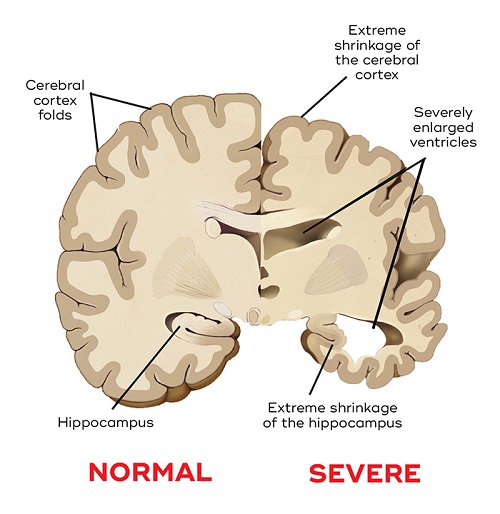
Alzheimer's disease slowly eats away at the brain, destroying memories and thinking skills. It begins as much as 20 years before any recognizable symptoms appear, such as memory loss and impaired judgment and thinking. In the later stages, symptoms may include confusion, mood and behavior changes.Those living in these stages may be unable to perform basic selfcare tasks like grooming, bathing or eating. Alzheimer's is ultimately a fatal disease.
Causes of Alzheimer's Disease
-
Age is the biggest risk factor for developing Alzheimer's disease. However, memory loss and Alzheimer's is NOT a normal part of aging. After age 65, a person's risk of developing Alzheimer's doubles every five years.
-
Family History & Genetics can also play a role in developing the disease. Both genetics and environments factors can impact more than one family member getting an illness.
-
Other Risk Factors can make a big impact on your risk. Research now shows us that we can do much to modify our risk by making lifestyle changes like eating a heart healthy diet, getting regular exercise, and improving sleep habits.

Symptoms of Alzheimer's Disease
Early in the disease, signs of Alzheimer's might include difficulty remembering recent conversations, names or events. Changes in mood such as apathy and depression are also common early symptoms. Later symptoms include impaired communication, poor judgment, disorientation, confusion, behavior changes and difficulty speaking, swallowing and walking.
10 Dementia Warning Signs & Symptoms
Memory loss: Forgetting recently learned information is one of the most common early signs of dementia. A person begins to forget more often and is unable to recall the information later.
Difficulty performing familiar tasks: People with dementia often find it hard to complete everyday tasks that were once so familiar, that were nearly automatic. Individuals may forget the steps to prepare a meal, use a household appliance or participate in a lifelong hobby.
Problems with language: People with Dementia related diseases like Alzheimer’s often forget simple words or substitute unusual words, making their speech or writing hard to understand. They may be unable to find the toothbrush, for example, and instead ask for “that thing for my mouth.''
Disorientation to time and place. People can become lost in their own neighborhoods, forget where they are or how they got there and not know how to get back home.
Poor or decreased judgement. Those with dementia or cognitive decline may dress inappropriately, wearing several layers on a warm day or little clothing in the cold. They may show poor judgement about money, like giving away large sums to telemarketers.
Problems with abstract thinking. Balancing a checkbook is a task that can be challenging for some. But a person with Alzheimer’s may forget what numbers are and how they should be used.
Misplacing things. Anyone can temporarily misplace a wallet or key. A person with Dementia however may put things in unusual places: an iron in the freezer or a wristwatch in the sugar bowl.
Changes in mood or behavior: Someone with a type of dementia can show rapid mood swings-from calm tears to anger-for no apparent reason.
Changes in personality. The personalities of people with dementia can change dramatically. They may become extremely confused, suspicious, fearful or dependent on a family member.
Loss of initiative. A person with a type of dementia may become very passive, sitting in front of the TV for hours, sleeping more than usual or not wanting to do usual activities.
Diagnosing Alzheimer's disease
Alzheimer’s is diagnosed through a complete medical assessment. Doctors conduct tests to assess memory impairment and other thinking skills, judge functional abilities, and identify behavior changes. They also perform a series of tests to rule out other possible causes of impairment. If you or a loved one have concerns about memory loss or other symptoms of Alzheimer’s or dementia, it is important to be evaluated by a physician.
There is no single test that can show whether a person has Alzheimer’s. While physicians can almost always determine if a person has dementia, it may be difficult to determine the exact cause. Diagnosing Alzheimer’s requires careful medical evaluation, including:
• A thorough medical history
• Cognitive / Memory Screening
• A physical and neurological exam
• Medical Tests and imaging (such as blood tests and brain imaging) to rule out other causes of dementia-like symptoms
Having trouble with memory does not mean you have Alzheimer’s. Many health issues can cause problems with memory and thinking. Your doctor may order other tests to rule out diseases that may be causing your symptoms. Generally speaking, doctors will perform a physical evaluation and check that you don’t have other health conditions that could be causing or contributing to your symptoms, such as signs of past strokes, Parkinson’s disease or other medical conditions. When dementia-like symptoms are caused by treatable conditions — such as depression, drug interactions, thyroid problems, excess use of alcohol or certain vitamin deficiencies — they may be reversed.
Benefits of Early Diagnosis
While it’s true that if you have Alzheimer’s or a related disease, doctors can’t offer a cure. But getting an early diagnosis can be beneficial. Knowing what you can do is just as important as knowing what you can’t do. If a person has another treatable condition that’s causing the cognitive impairment or somehow complicating the impairment, then doctors can start treatments.
Although the onset of Alzheimer’s disease cannot yet be stopped or reversed, an early diagnosis allows people with dementia and their families:
• Appropriate community services and resources
• Options for residential and in-home care
• Plans for handling financial issues
• Expectations for future care and medical decisions
When a doctor tells you and your family members about an Alzheimer’s diagnosis, he or she should help you understand Alzheimer’s, answer questions and explain what to expect with Alzheimer’s.
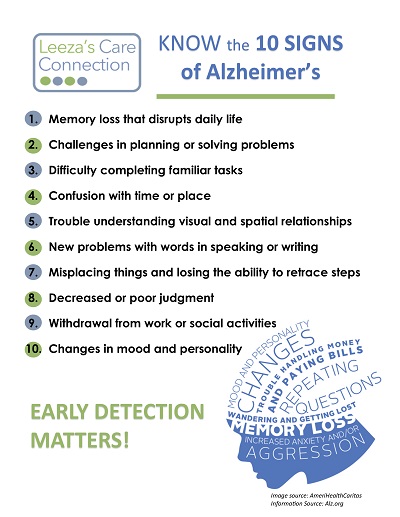
Stages of Alzheimer's
No one's journey with Alzheimer's or other dementia looks the same. Each individual will progress differently at different paces and stages. Knowing what to expect can help you prepare for future care. Dementia care is marathon, not a sprint!
If you need someone to help you understand these behaviors or need tips for coping with them, we're here for you. Email us or call 800-OK-LEEZA.
Click Here for Dementia Care Tips and Strategies
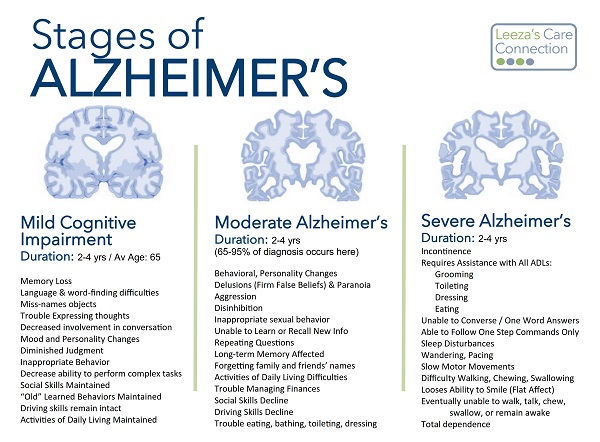
Behavioral and psychiatric symptoms
Alzheimer’s disease does more than rob people of their memories and those diagnosed experience two types of symptoms. Cognitive symptoms disrupt memory, language and thinking and behavioral and psychiatric symptoms, can cause personality changes and agitation. Often those diagnosed with Alzheimer’s and their families find the behavioral symptoms to be the most challenging and distressing effects of the disease.
What ARE behavioral and psychiatric symptoms of Alzheimer’s disease?
The term “behavioral and psychiatric symptoms” refers to a large group of symptoms that occur in many — but not all — individuals with Alzheimer’s. In early stages of the disease, people may experience irritability, anxiety or depression. In later stages, other symptoms may occur, including:
• Sleep disturbances
• Physical or verbal outbursts
• Emotional distress
• Restlessness, pacing, shredding paper or tissues and yelling
• Delusions (firmly held belief in things that are not real)
• Hallucinations (seeing, hearing or feeling things that are not there)
Causes of behavioral and psychiatric symptoms
The chief cause of behavioral and psychiatric symptoms is the progressive deterioration of brain cells. However, medication, environmental influences and some medical conditions can also cause symptoms or make them worse.
For example, behavioral symptoms can sometimes be traced to an underlying medical condition. Anyone experiencing behavioral symptoms should receive a thorough medical evaluation, especially when symptoms appear suddenly. Examples of treatable conditions that can trigger behavioral symptoms include infections of the ear, sinuses, urinary or respiratory tracts; constipation; and uncorrected problems with hearing or vision.
Side effects of prescription medication are another common contributing factor to behavioral symptoms. Side effects are especially likely to occur when individuals are taking multiple medications for several health conditions, as that creates the potential for drug interactions.
The following situations and environmental conditions can also trigger behavioral symptoms:
• Moving to a new residence or nursing home
• Changes in the environment or caregiver arrangements
• Misperceived threats
Treatment
With proper treatment, symptoms can be significantly reduced and stabilized. Successful treatment depends on recognizing which symptoms the person is experiencing, making a careful assessment and identifying possible causes of the symptoms. Talk to your doctor about symptoms and behaviors. It can help to keep a journal or log of symptoms to provide medical staff.
Develop a Strategy
1. Identifying the symptom
2. Understanding its cause
3. Adapting the caregiving environment to remedy the situation
Correctly identifying what triggered the behavior can help in selecting the best intervention. Often, the trigger is some sort of change in the person’s environment, such as change in caregiver or in living arrangements; travel; admission to a hospital; presence of houseguests; or being asked to bath or change clothing.
Adapting the environment
A key principle of intervention is redirecting the person’s attention, rather than arguing or being confrontational. Additional strategies include:
-
Simplifying the environment, tasks and routines
-
Allowing adequate rest between stimulating events
-
Using labels to cue or remind the person
-
Increasing the safety of the environment by equipping doors and gates with locks, and removing guns and other weapons
-
Using lighting to reduce confusion and restlessness at night
Other Types of Dementia
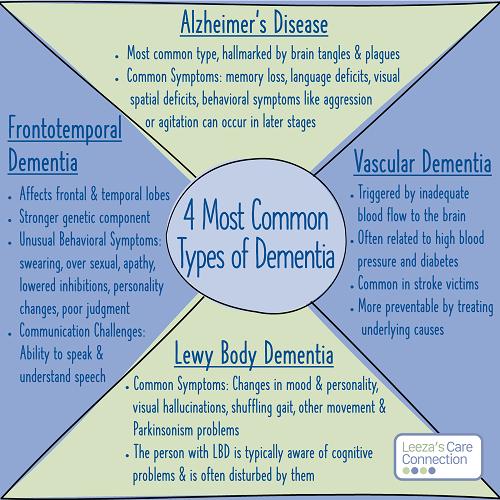
VASCULAR DEMENTIA
Previously known as multi-infarct or post-stroke dementia, vascular dementia is less common as a sole cause of dementia than Alzheimer’s.
SYMPTOMS: Impaired judgment or ability to make decisions, plan or organize is more likely to be the initial symptom, as opposed to the memory loss often associated with the initial symptoms of Alzheimer's. Occurs from blood vessel blockage or damage leading to infarcts (strokes) or bleeding in the brain. The location, number and size of the brain injury determines how the individual's thinking and physical functioning are affected.
Dementia with Lewy Bodies
Previously known as multi-infarct or post-stroke dementia, vascular dementia is less common as a sole cause of dementia than Alzheimer’s.
SYMPTOMS: People with dementia with Lewy bodies often have memory loss and thinking problems common in Alzheimer's, but are more likely than people with Alzheimer's to have initial or early symptoms such as sleep disturbances, well-formed visual hallucinations, and slowness, gait imbalance or other parkinsonian movement features.
Frontotemporal Dementia
Includes dementias such as behavioral variant FTD (bvFTD), primary progressive aphasia, Pick's disease, corticobasal degeneration and progressive supranuclear palsy.
SYMPTOMS: Typical symptoms include changes in personality and behavior (including sexual behaviors) and difficulty with language. Nerve cells in the front and side regions of the brain are especially affected.
Parkinson's Disease
As Parkinson's disease progresses, it often results in a progressive dementia similar to dementia with Lewy bodies or Alzheimer's.
SYMPTOMS: Problems with movement are common symptoms of the disease. If dementia develops, symptoms are often similar to dementia with Lewy bodies.
Parkinson’s Resources:
The Parkinson’s Foundation: https://www.parkinson.org/
The Michael J. Fox Foundation: https://www.michaeljfox.org/parkinsons-101
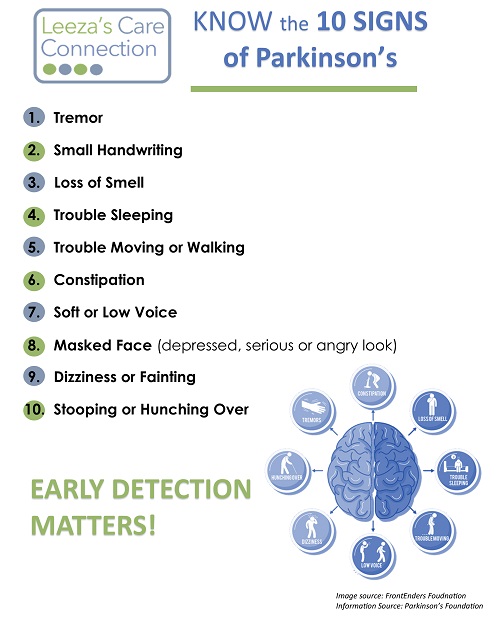
10 Early Symptoms of Parkinson’s Disease:
Below are 10 signs that you or a loved might have the disease. No single one of these signs means that you should worry, but if you have more than one sign you should consider consulting with your doctor.
1. Tremor
Have you noticed a slight shaking or tremor in your finger, thumb, hand or chin? A tremor while at rest is a common early sign of Parkinson's disease.
What is normal? Shaking can be normal after lots of exercise, if you are stressed or if you have been injured. Shaking could also be caused by a medicine you take.
2. Small Handwriting
Has your handwriting gotten much smaller than it was in the past? You may notice the way you write words on a page has changed, such as letter sizes are smaller and the words are crowded together. A change in handwriting may be a sign of Parkinson's disease called micrographia.
What is normal? Sometimes writing can change as you get older, if you have stiff hands or fingers or poor vision.
3. Loss of Smell
Have you noticed you no longer smell certain foods very well? If you seem to have more trouble smelling foods like bananas, dill pickles or licorice, you should ask your doctor about Parkinson's.
What is normal?
Your sense of smell can be changed by a cold, flu or a stuffy nose, but it should come back when you are better.
4. Trouble Sleeping
Do you thrash around in bed or act out dreams when you are deeply asleep? Sometimes, your spouse will notice or will want to move to another bed. Sudden movements during sleep may be a sign of Parkinson's disease.
What is normal?
It is normal for everyone to have a night when they 'toss and turn' instead of sleeping. Similarly, quick jerks of the body when initiation sleep or when in lighter sleep are common and often normal.
5. Trouble Moving or Walking
Do you feel stiff in your body, arms or legs? Have others noticed that your arms don’t swing like they used to when you walk? Sometimes stiffness goes away as you move. If it does not, it can be a sign of Parkinson's disease. An early sign might be stiffness or pain in your shoulder or hips. People sometimes say their feet seem “stuck to the floor.”
What is normal?
If you have injured your arm or shoulder, you may not be able to use it as well until it is healed, or another illness like arthritis might cause the same symptom.
6. Constipation
Do you have trouble moving your bowels without straining every day? Straining to move your bowels can be an early sign of Parkinson's disease and you should talk to your doctor.
What is normal?
If you do not have enough water or fiber in your diet, it can cause problems in the bathroom. Also, some medicines, especially those used for pain, will cause constipation. If there is no other reason such as diet or medicine that would cause you to have trouble moving your bowels, you should speak with your doctor.
7. A Soft or Low Voice
Have other people told you that your voice is very soft or that you sound hoarse? If there has been a change in your voice you should see your doctor about whether it could be Parkinson's disease. Sometimes you might think other people are losing their hearing, when really you are speaking more softly.
What is normal?
A chest cold or other virus can cause your voice to sound different, but you should go back to sounding the same when you get over your cough or cold.
8. Masked Face
Have you been told that you have a serious, depressed or mad look on your face, even when you are not in a bad mood? This is often called facial masking. If so, you should ask your doctor about Parkinson's disease.
What is normal?
Some medicines can cause you to have the same type of serious or staring look, but you would go back to the way you were after you stopped the medication.
9. Dizziness or Fainting
Do you notice that you often feel dizzy when you stand up out of a chair? Feeling dizzy or fainting can be a sign of low blood pressure and can be linked to Parkinson's disease (PD).
What is normal?
Everyone has had a time when they stood up and felt dizzy, but if it happens on a regular basis you should see your doctor.
10. Stooping or Hunching Over
Are you not standing up as straight as you used to? If you or your family or friends notice that you seem to be stooping, leaning or slouching when you stand, it could be a sign of Parkinson's disease (PD).
What is normal?
If you have pain from an injury or if you are sick, it might cause you to stand crookedly. Also, a problem with your bones can make you hunch over.
